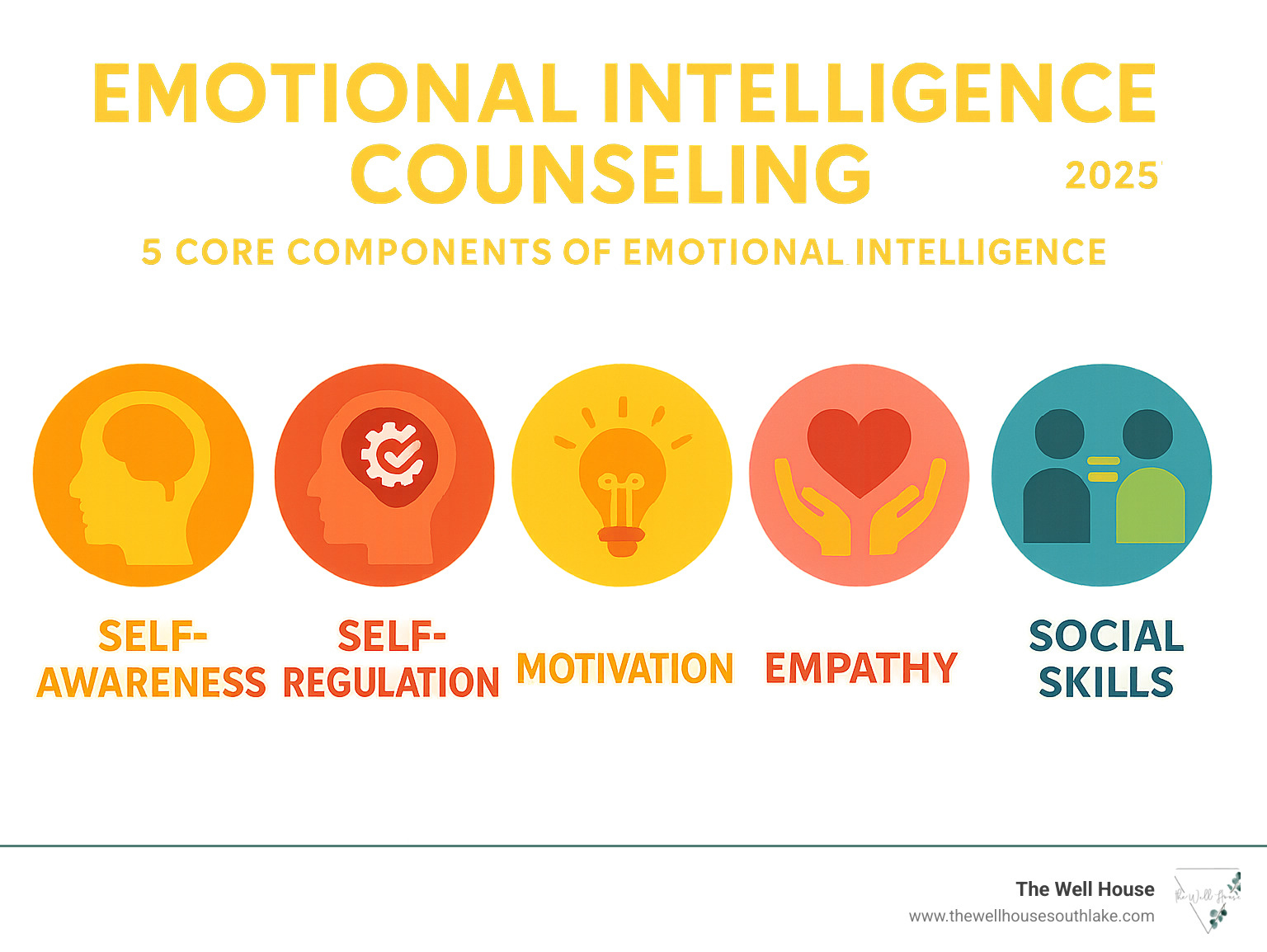How to Boost Your Emotional Intelligence (Without Crying in Public)
What is Emotional Intelligence (EI) and How Counseling Can Help
Many people wonder what emotional intelligence counseling is all about. Simply put, it’s a type of support that helps you grow in understanding and managing your own emotions. It also teaches you how to recognize and respond to the feelings of others.
Emotional intelligence counseling aims to help you build key skills:
- Self-awareness: Knowing your own feelings and how they affect you.
- Emotional Regulation: Managing your emotions in healthy ways.
- Empathy: Understanding and sharing the feelings of others.
- Social Skills: Building strong relationships and communicating well.
You might know someone who is very smart in books but struggles with people. They might find work or relationships tough. This often points to a difference between “book smarts” (IQ) and “people smarts” (Emotional Intelligence, or EQ).
Emotional intelligence is not something you’re born with. It’s a skill you can learn and improve at any point in your life. It can truly change how you handle stress, relate to your loved ones, and feel about yourself.
I’m Jennifer Kruse, and I’ve spent years helping individuals steer these challenges through compassionate emotional intelligence counseling. My approach supports clients in finding healing and wholeness by exploring emotional, physical, and spiritual alignment.

Important emotional intelligence counseling terms:
Why Your EQ Matters More Than Your IQ (Especially at Work and in Love)
Ever wonder what truly sets people apart? Maybe you know someone brilliant on paper, but they struggle to connect with others or handle pressure. Or perhaps you’ve met someone who just seems to get people, effortlessly navigating tough situations and building incredible relationships. The secret often lies not just in how smart you are (your IQ), but in how emotionally intelligent you are (your EQ). While your IQ might open doors, it’s often your EQ that truly determines how far you’ll go – in your career, your relationships, and your overall happiness.
Think about it: people who shine with high emotional intelligence naturally build stronger bonds. They show up with empathy and understanding, making it easy to build trust and connect deeply. These are also the folks who often excel in leadership, inspiring teams with their clear communication and genuine ability to motivate. And here’s a powerful truth: a high EQ doesn’t just improve your interactions; it profoundly boosts your overall well-being. Studies, like a 2018 report on North Americans, even show that people with high EQ are eight times more likely to experience a high quality of life. We see this change firsthand, every single day, with clients who engage in emotional intelligence counseling.
Beyond the social benefits, your emotional intelligence plays a huge role in your mental and physical health. In fact, a strong EQ can actually improve your lifelong well-being even more than academic smarts. Imagine being better equipped to understand your own feelings, especially when facing tough emotions like anxiety or depression. Research suggests that a lower EQ can sometimes be linked to these struggles. By building your emotional intelligence, you gain powerful tools to steer your inner world with greater ease and resilience. Curious to dive deeper into the science? You can explore scientific research on Emotional intelligence.
The Career Advantage
Let’s talk about work. Whether you’re aiming for that promotion, building a thriving team, or simply want to feel more fulfilled in your daily job, your EQ is your most powerful tool. It might surprise you, but for true workplace success, your emotional intelligence often outweighs your IQ. Why? Because work isn’t just about technical skills or crunching numbers. It’s about how you steer relationships, manage pressure, and inspire those around you.
Think about the best leaders you know. They probably have a high EQ, effortlessly guiding teams, fostering a positive atmosphere, and keeping valuable employees engaged. Businesses are catching on! More and more companies now prioritize emotional intelligence as much as, or even more than, technical ability when hiring.
Here’s a striking thought: a whopping 75% of careers are derailed not because of a lack of skill, but because of EQ-related challenges. On the flip side, 90% of top performers boast a high EQ. It truly is the biggest predictor of success in the workplace. With a strong EQ, you’re better equipped to handle tough conversations, give and receive feedback gracefully, and even prevent burnout.
The Relationship Advantage
Beyond the office, your EQ profoundly shapes your personal life. Our connections – with partners, family, and friends – are truly the foundation of a happy life. People with high emotional intelligence often enjoy happier, healthier marriages and deeper family bonds. They simply know how to communicate effectively, understand different viewpoints, and steer disagreements with grace and respect.
With a strong EQ, you’re empowered to build truly deeper connections because you genuinely understand and empathize with your loved ones. You can resolve conflicts constructively, turning potential arguments into opportunities for growth rather than letting them escalate. And crucially, you foster unwavering trust because your ability to manage your own emotions and respond thoughtfully creates a powerful sense of reliability. This allows you to create the kind of loving, supportive relationships we all crave. For more insights on building stronger bonds, explore More info about Communicating with Your Partner for Better Connection.
The Well-being Advantage
Finally, let’s talk about you – your personal well-being. Your emotional intelligence plays a monumental role here. It’s not just about smiling more; it’s about building resilience, mastering stress management, and finding genuine inner peace.
We all know stress can be a real problem, impacting everything from our blood pressure to our immune system. But when you have a high EQ, you’re better equipped to understand why you feel stressed and, more importantly, how to cope in healthy ways. This leads to significantly lower stress levels, a greater sense of life satisfaction, and overall improved emotional health.
Statistic we shared earlier? People with high EQ are eight times more likely to experience a high quality of life. This isn’t just a happy accident. When you truly grasp and manage your emotions, you gain an incredible ability to adapt to life’s twists and turns. You can reduce anxiety, steer challenges with more calm, and even lessen the grip of depressive symptoms. Imagine facing life’s ups and downs with a sense of control and inner strength – that’s the powerful well-being advantage a higher EQ brings.
The Counselor’s Toolkit: How Emotional Intelligence Counseling Works
So, you’re curious about how we actually help you build that emotional superpower we’ve been talking about? Emotional intelligence counseling is a special kind of support designed to help you explore your inner world and develop practical skills. Think of it like having a skilled guide by your side, helping you steer a complex emotional landscape that might feel overwhelming on your own. It’s much better than trying to find your way blindfolded!

Here at The Well House, we believe in a warm, collaborative, and holistic approach. We focus on your mind, body, and spirit wellness because true emotional intelligence comes from feeling whole and connected within yourself. We create a safe space where you can share your feelings without any judgment. Our professional guidance helps you gain fresh insights and understand your emotional patterns. This guided introspection is key to helping you uncover your authentic self – what we like to call self-findy. If you’re also looking for support with stress, we offer valuable insights on More info about Stress Management for Young Adults.
Understanding Your Inner World: The First Step in Emotional Intelligence Counseling
The path to a higher EQ always begins with truly understanding yourself – we call this self-awareness. It’s about becoming a detective of your own feelings, learning what sparks them, and how they shape your thoughts and actions. This isn’t always easy, especially if you’ve spent years pushing emotions away or ignoring their signals.
In emotional intelligence counseling, we work together to help you identify your emotions. We go beyond just “good” or “bad,” helping you recognize the subtle shades of your emotional experiences. Are you feeling frustrated, anxious, disappointed, or something else entirely? We even explore the body sensations that come with these feelings, as noticing these physical cues is a powerful way to connect with your emotions. From there, we help you recognize your triggers – what situations, people, or even thoughts tend to set off specific emotional reactions for you. Understanding these personal patterns is vital for managing your responses.
We also dive into helping you understand your thought patterns. Our thoughts play a huge role in how we feel. We’ll explore how your internal conversations and beliefs might be adding to your emotional state, and we might even use thought records to help you track and understand these links. To further boost your self-findy, we encourage practice self-reflection through tools like journaling. Writing about your emotional responses helps you notice patterns, recognize triggers, and develop a much clearer picture of your rich inner world.
Mastering Your Reactions with Proven Therapeutic Techniques
Once you’re more aware of your emotions, the next step in emotional intelligence counseling is learning to manage them effectively. This doesn’t mean stuffing them down; it means responding to them in healthy, constructive ways. We use a range of evidence-based therapeutic approaches custom to your unique needs.
We might explore Cognitive-Behavioral Therapy (CBT), which helps you spot and challenge negative thought patterns that fuel emotional distress. If you often jump to the worst conclusion, CBT helps you gently reframe those thoughts to be more realistic. We also dig into Mindfulness-Based Therapy, which builds present-moment awareness. This helps you observe your feelings without getting swept away by them. We might use gentle meditative exercises, focusing on sensations, to help you stay grounded and observe emotions without judgment. Mindfulness is a powerful way to truly perceive your emotions, which is foundational to a higher EQ. You can read more about EMDR and Mindfulness and what these practices involve at What are mindfulness practices?.
Another valuable approach is Acceptance and Commitment Therapy (ACT). ACT teaches you to accept difficult emotions instead of fighting them, while committing to actions that align with what truly matters to you. It helps you live fully in the present and act according to your deepest values, even when emotions are challenging. These techniques give you a robust toolkit to steer intense feelings, prevent emotional “hijacking,” and respond thoughtfully rather than reacting impulsively.
Building Bridges: Improving Social Skills Through Emotional Intelligence Counseling
Emotional intelligence isn’t just about you; it’s also deeply about your interactions with others. The social skills component focuses on understanding and influencing the emotions of those around you. This leads to more fulfilling relationships and truly effective communication.
In emotional intelligence counseling, we help you develop key social skills like empathy. This is the amazing ability to truly understand another person’s experience by stepping into their shoes. We encourage you to approach others’ emotions with genuine concern. We also focus on active listening, a crucial skill that involves being non-judgmental, patient, and truly hearing what others say. This means using encouraging sounds (“mm-hmm”), asking thoughtful questions, and summarizing to make sure you’ve understood. It helps you grasp the deeper emotions and nuances in conversations.
We also work on improving your social awareness. This involves recognizing and interpreting nonverbal cues from others, like body language and facial expressions. These unspoken signals offer deep insights into emotional states. Did you know that research shows cultures worldwide express emotions through similar facial expressions? Finally, we help with assertiveness training. Learning to express your true feelings and needs respectfully and clearly is vital for healthy relationships. We might even use role-playing exercises in sessions to practice asserting yourself, helping you move from feelings of worthlessness to a place of self-assurance. By honing these social skills, you’ll find yourself building stronger, more authentic connections, whether with a partner, family member, friend, or colleague.
The Real-World Payoff: Tangible Benefits of Higher Emotional Intelligence
Investing in emotional intelligence counseling isn’t just about feeling better; it’s about living better. The skills you develop translate directly into tangible improvements across all areas of your life. When you can understand and manage your emotions, and empathize with others, you open up a powerful potential for growth and success.
The benefits are far-reaching: improved relationships, effective leadership, improved decision-making, greater personal fulfillment, and better communication. You’ll experience increased life satisfaction, improved emotional well-being, lower stress levels, better conflict resolution skills, and heightened adaptability. For those interested in improving relationships, More info about Conflict Resolution Marriage Counseling can provide additional insights.
Counseling Services in Southlake
Improve emotional intelligence with personalized counseling sessions. Book your appointment now.
At the Office
Your workplace is a microcosm of human interaction, and a high EQ is your ultimate asset.
- Motivating others: Emotionally intelligent leaders create empathetic, respectful workplaces where effective communication, creativity, and innovation flourish. They are attuned to their team members’ needs, fostering supportive environments.
- Navigating office politics: Understanding the emotional currents and unspoken dynamics helps you move through complex professional situations with grace and effectiveness.
- Giving and receiving feedback: You can deliver constructive criticism without causing offense and accept feedback without feeling defensive, turning critiques into opportunities for growth.
- Preventing burnout: By effectively managing your own stress and emotions, you can maintain sustained motivation and perseverance through obstacles, leading to long-term career success.
- Increased productivity: When you’re not bogged down by emotional turmoil, you can focus better, make clearer decisions, and contribute more effectively.
At Home
Home is where the heart is, and a high EQ ensures your heart thrives in its most important relationships.
- Deeper intimacy: Emotional intelligence fosters open communication, kindness, generosity, and authentic intimacy. You can express your needs and understand your partner’s, leading to a more connected and fulfilling relationship.
- Resolving arguments constructively: Instead of repeating the same fights, you can identify the core needs beneath explosive conflicts and work towards productive problem-solving, minimizing emotional distress.
- Healthier parenting: Understanding your children’s emotions and teaching them how to express their feelings in healthy ways creates a more harmonious family environment. You can model healthy emotional regulation and conflict resolution for them.
- Stronger family bonds: Empathy and effective communication build a foundation of trust and understanding, making family life more supportive and joyful.
For couples seeking to deepen their connection, exploring More info about Emotionally Focused Couples Therapy can be incredibly beneficial.
Keeping Your Cool: Maintaining Your EI Skills for the Long Haul
Building emotional intelligence through emotional intelligence counseling isn’t a destination – it’s a journey that unfolds over your entire lifetime. Think of it like learning to play the piano. You don’t master it in a few lessons and then put it away forever. The more you practice, the more natural and beautiful it becomes.
The beautiful thing about emotional intelligence is that it grows stronger with continuous practice. Every difficult conversation, every stressful day, every moment of joy becomes an opportunity to deepen your skills. At The Well House, we don’t just send you out into the world after counseling ends – we equip you with a toolkit for lifelong learning.
Self-reflection becomes your daily companion. Regular mindfulness exercises help you stay grounded in the present moment. Building strong support networks ensures you have people to turn to when life gets challenging. And seeking feedback from trusted friends and family keeps you honest about your growth areas.
The key is making these practices feel natural, not like another item on your to-do list. When you weave emotional intelligence into your daily routine, it becomes as automatic as brushing your teeth.
Daily Habits for a Higher EQ
Small, consistent actions create the biggest changes. Your daily emotion check-in might happen during your morning coffee or evening wind-down. Simply ask yourself: “What am I feeling right now, and what might have caused it?” This simple practice builds the self-awareness that’s foundational to everything else.
Mindful breathing breaks become your reset button throughout the day. When you feel that familiar surge of frustration in traffic or anxiety before a big meeting, three deep breaths can shift your entire nervous system. It’s amazing how something so simple can be so powerful.
Expressing gratitude regularly rewires your brain toward positivity. Whether you jot down three things you’re grateful for or simply pause to appreciate a beautiful sunset, this practice improves your overall emotional state and helps you approach challenges with a clearer mind.
Practicing active listening with friends, family, and colleagues deepens every relationship in your life. When you truly focus on what someone is saying – both with their words and their body language – you’re not just hearing them, you’re understanding them. This builds the empathy and social awareness that make you a magnet for meaningful connections.
Reading social cues becomes a fun game you can play anywhere. Try watching a few minutes of a movie with the sound off, then check your perceptions when you turn it back on. You’ll be surprised how much you can understand from facial expressions and body language alone.
Journaling helps you track patterns and celebrate your growth. When you write about your emotional experiences, you’re not just recording events – you’re processing them, learning from them, and reinforcing healthier responses for next time.
Seeking feedback from people you trust keeps you growing. Sometimes we have blind spots we can’t see ourselves. A caring friend or family member can offer insights that help you continue evolving.
These aren’t just habits – they’re investments in a richer, more connected life. When you make them part of your routine, you’re not just maintaining your emotional intelligence; you’re deepening it every single day.
Frequently Asked Questions about Improving Emotional Intelligence
We often hear similar questions from individuals exploring emotional intelligence counseling. Here are some common inquiries and our answers:
Is emotional intelligence something you’re born with, or can it be learned?
This is a fantastic question, and one we hear often! While it’s true that some people seem to have a natural knack for understanding emotions, the truly wonderful news is that emotional intelligence is absolutely a learnable skill. It’s not something you’re just born with, like the color of your eyes, and it’s certainly not fixed.
Our brains are incredibly adaptable, a concept known as neuroplasticity. This means that with focused effort and practice, you can literally reshape your brain’s pathways to become more emotionally intelligent. Through dedicated work, especially with the guidance offered in emotional intelligence counseling, you can significantly boost your self-awareness, improve your emotional regulation, deepen your empathy, and sharpen your social skills. It’s a journey of growth, and we’re here to walk alongside you every step of the way.
How is emotional intelligence counseling different from regular therapy?
That’s a great distinction to make! While there’s certainly some overlap, emotional intelligence counseling tends to have a more specific focus compared to general therapy. Think of it this way: traditional therapy often addresses a broader range of mental health concerns, like anxiety, depression, or past traumas, aiming for overall healing and well-being.
Our approach in emotional intelligence counseling is more goal-oriented and proactive. We specifically focus on helping you develop and fine-tune your emotional competencies. This might involve using specific assessments to pinpoint your strengths and areas for growth in EI. We equip you with concrete, practical tools to better understand and manage your own emotions, and to more effectively steer your interactions with others. It’s about building tangible skills in areas like self-awareness, emotional regulation, empathy, and social skills.
However, these areas are deeply connected. Improving your emotional intelligence often naturally leads to a reduction in symptoms of underlying issues like anxiety or depression. So, while the focus is distinct, the benefits for your overall mental health are beautifully intertwined.
Boost Your Emotional Intelligence – Contact Us
Learn to manage emotions and relationships effectively. Call our Southlake therapists today.
How long does it take to see improvements in emotional intelligence?
This is a very common question, and honestly, the timeline for seeing improvements in emotional intelligence can vary quite a bit from person to person. There’s no one-size-fits-all answer, as it really depends on where you’re starting from, the specific challenges you’re facing, and how consistently you practice what you learn.
Many clients share that they begin to notice early benefits within just a few sessions. This might look like a clearer understanding of their own emotions, or a new ability to pause before reacting impulsively. These initial sessions often provide a wonderful sense of stability, hope, and a clear plan for moving forward.
For deeper, more lasting changes in areas like truly mastering emotional regulation or building deeply ingrained social skills, it typically takes several months of consistent work in emotional intelligence counseling. But here’s the beautiful truth: developing your emotional intelligence is truly a lifelong journey of continuous learning and practice. It’s not a finish line you cross, but rather a muscle you keep strengthening. Each subsequent session builds upon the last, helping you implement and refine these powerful tools for the long haul.
Your Journey to a Higher EQ Starts Now
So, we’ve talked a lot about emotional intelligence, right? It’s not just a fancy term; it’s truly a core skill that helps you shine in every part of your life. Imagine navigating challenging conversations at work with ease, building deeper, more loving connections at home, and feeling calm and confident in yourself. That’s the power of a high EQ. It empowers you to truly thrive.
The really good news? This vital skill isn’t something you’re just born with. It’s completely learnable, and you absolutely don’t have to figure it out alone. Think of it as a journey, and like any important journey, having a guide makes all the difference.
That’s where The Well House comes in. We offer kind, personalized mental health services, including specialized emotional intelligence counseling, designed to help you open up your full potential. Our team of diverse counselors takes a supportive, holistic approach, caring for your mind, body, and spirit. We also make it easy to get started with flexible options like telehealth, and convenient locations in Southlake, Westlake, Grapevine, Roanoke, and Trophy Club, TX.
If you’re ready to truly understand your inner world, master your emotional responses, and build stronger, more authentic connections, then your journey to a higher EQ begins today. Let us gently guide you on this transformative path, offering professional support and warmth every step of the way. And for young adults looking for a place to start, you can Get real help with counseling for young adults.
Insurance & Payment Options at The Well House Southlake
At The Well House Southlake, we believe that quality mental health care should be both accessible and affordable. Whether you’re seeking therapy, couples counseling, or online sessions, our goal is to make it easy for you to access therapy that takes insurance and supports your unique needs.
We currently accept:
- Blue Cross Blue Shield (BCBS)
- Aetna
- UnitedHealthcare (UHC)
- Self-Pay and Out-of-Network Options
If you’re exploring counseling that takes insurance or need help verifying your coverage, our team will guide you through each step — from confirming your benefits to booking your first session. We’re committed to making your experience simple and stress-free, so you can focus on what matters most: your well-being.













